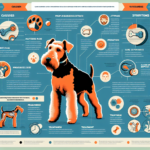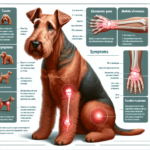Airedale Terrier Joint Pain: Causes, Symptoms, Prevention, and Treatment

Introduction
The Airedale Terrier, often referred to as the “King of Terriers,” is a versatile and intelligent breed known for its distinctive appearance and spirited personality. Originating from the Aire Valley in Yorkshire, England, the Airedale Terrier was initially bred for hunting otters and rats in the region between the Aire and Wharfe Rivers. Over time, the breed has proven its versatility, excelling in various roles such as police work, military service, and companionship.
Despite their robust and energetic nature, Airedale Terriers are not immune to health issues. Like many breeds, they can be prone to certain genetic and age-related conditions, including joint pain. Joint health is particularly crucial for Airedale Terriers due to their active lifestyle and working heritage. Ensuring their joints remain healthy is essential for maintaining their quality of life and overall well-being.
Breed-Specific Joint Pain Risks
Genetic Predisposition
Airedale Terriers, like many purebred dogs, have a genetic predisposition to certain joint-related issues. Hip dysplasia, a condition where the hip joint does not fit properly into the hip socket, is relatively common in this breed. This malformation can lead to arthritis and significant pain over time. Elbow dysplasia, another hereditary condition, affects the elbow joint and can cause lameness and discomfort.
Age-Related Risks
As Airedale Terriers age, the risk of developing joint pain increases. Arthritis, a degenerative joint disease, is particularly prevalent in older dogs. For Airedales, signs of joint pain may start to appear as early as middle age, around 5-7 years old. It’s essential for owners to be vigilant and proactive in monitoring their dog’s joint health as they age.
Activity Level and Joint Stress
Airedale Terriers are known for their high energy levels and love for physical activity. Whether they are participating in agility courses, hunting, or simply enjoying a vigorous play session, their joints are subjected to significant stress. While regular exercise is beneficial, excessive or high-impact activities can exacerbate joint issues, especially if the dog has a predisposition to joint problems.
Common Symptoms of Joint Pain in Airedale Terriers
General Symptoms
Owners should be aware of several common symptoms that may indicate joint pain in their Airedale Terrier:
- Limping: A noticeable limp or favoring one leg over another.
- Stiffness: Difficulty in getting up or lying down, especially after rest.
- Reluctance to Move: Hesitation or refusal to engage in physical activities they once enjoyed.
- Swelling: Visible swelling around the joints.
- Behavioral Changes: Increased irritability or signs of discomfort when touched.
Breed-Specific Symptoms
In Airedale Terriers, joint pain may manifest in specific ways due to their unique build and activity levels. Owners might notice a decrease in their dog’s enthusiasm for activities that involve jumping or running. Additionally, Airedales may exhibit a more pronounced limp or stiffness in the hind legs, given their predisposition to hip dysplasia.
When to Consult a Vet
If an Airedale Terrier shows any signs of joint pain, it’s crucial to consult a veterinarian promptly. Early intervention can prevent further deterioration and improve the dog’s quality of life. Persistent limping, noticeable pain, or any significant changes in behavior should be addressed by a professional.
Preventive Measures for Joint Health
Exercise Recommendations
Regular, moderate exercise is vital for maintaining joint health in Airedale Terriers. Activities such as swimming, which provides a full-body workout without putting stress on the joints, are highly recommended. Avoid high-impact exercises like excessive running or jumping, especially on hard surfaces. Instead, opt for controlled activities that promote muscle strength and flexibility.
Dietary Suggestions
A balanced diet rich in essential nutrients can support joint health. Foods containing glucosamine and chondroitin are beneficial for maintaining cartilage health. Omega-3 fatty acids, found in fish oil, can help reduce inflammation. Consider incorporating these supplements into your Airedale’s diet after consulting with a veterinarian.
Weight Management
Maintaining a healthy weight is crucial for reducing joint stress. Excess weight can exacerbate joint pain and lead to further complications. Regularly monitor your Airedale’s weight and adjust their diet and exercise routine as needed to ensure they remain within a healthy weight range.
Early Screening and Monitoring
Early screening for joint issues can help catch problems before they become severe. Regular veterinary check-ups, including X-rays and physical examinations, can identify early signs of joint deterioration. For Airedale Terriers, it’s advisable to start screening for hip and elbow dysplasia from a young age.
Treatment Options for Joint Pain
Non-Surgical Treatments
Several non-surgical treatments can help manage joint pain in Airedale Terriers:
- Medications: Anti-inflammatory drugs and pain relievers can provide relief from joint pain.
- Physical Therapy: Specialized exercises and therapies can improve joint function and reduce pain.
- Lifestyle Adjustments: Modifying the dog’s activity level and providing a comfortable living environment can alleviate symptoms.
Surgical Options
In severe cases, surgical intervention may be necessary. Common surgical options for joint pain include:
- Hip Replacement: Replacing the damaged hip joint with an artificial one.
- Arthroscopy: A minimally invasive procedure to clean out the joint and remove damaged tissue.
- Osteotomy: Cutting and realigning bones to improve joint function.
Alternative Therapies
Alternative treatments can also be beneficial for managing joint pain in Airedale Terriers:
- Acupuncture: This ancient practice can help reduce pain and improve mobility.
- Hydrotherapy: Water-based exercises that provide a low-impact workout for the joints.
- Massage: Regular massages can help alleviate muscle tension and improve circulation.
Lifestyle and Management Tips
Daily Care Routine
A consistent daily care routine can help manage joint pain in Airedale Terriers. This routine might include gentle morning exercises, a balanced diet with joint supplements, and regular rest periods. Monitoring their activity levels and ensuring they do not overexert themselves is crucial.
Modifying the Home Environment
Making the home environment more comfortable can significantly improve the quality of life for a dog with joint pain. Consider the following modifications:
- Ramps: Install ramps to help your dog navigate stairs or get onto furniture without jumping.
- Orthopedic Beds: Provide a supportive bed that cushions their joints.
- Non-Slip Flooring: Ensure floors are non-slip to prevent falls and further joint stress.
Long-Term Management
Long-term management of joint pain involves regular veterinary check-ups, consistent exercise, and a balanced diet. Keeping your Airedale Terrier active and engaged with low-impact activities can help maintain their mobility and overall happiness. Regularly reassess their condition and adjust their care routine as needed.
FAQs About Airedale Terriers and Joint Pain
What are the early signs of joint pain in Airedale Terriers?
Early signs include limping, stiffness, reluctance to move, and behavioral changes such as irritability or discomfort when touched.
Can joint pain in Airedale Terriers be prevented?
While genetic predispositions cannot be entirely prevented, maintaining a healthy weight, providing a balanced diet, and ensuring regular, moderate exercise can significantly reduce the risk of joint pain.
Are there specific exercises that are better for Airedale Terriers with joint pain?
Yes, low-impact exercises such as swimming and controlled walking are beneficial. Avoid high-impact activities that can exacerbate joint issues.
When should I consult a vet about my Airedale Terrier’s joint pain?
If you notice persistent limping, significant changes in behavior, or any signs of discomfort, it’s essential to consult a veterinarian promptly.
What dietary supplements can help with joint health in Airedale Terriers?
Supplements containing glucosamine, chondroitin, and omega-3 fatty acids can support joint health. Always consult with a veterinarian before adding supplements to your dog’s diet.
Conclusion
Joint pain is a significant concern for Airedale Terriers, given their genetic predisposition and active lifestyle. By understanding the causes, symptoms, and preventive measures, owners can take proactive steps to ensure their dog’s joint health. Regular veterinary check-ups, a balanced diet, appropriate exercise, and a comfortable living environment are crucial for managing and preventing joint pain. By staying vigilant and informed, you can help your Airedale Terrier lead a happy, active, and pain-free life.




